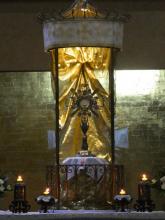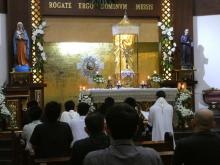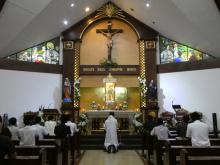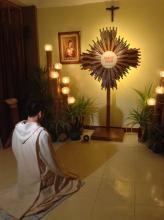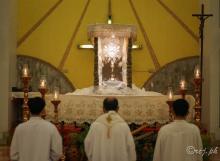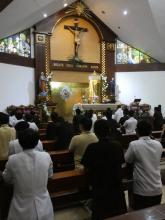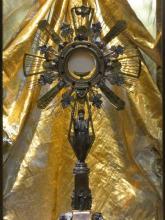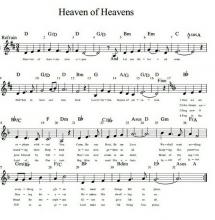In view of the ongoing celebration of the 40 years of presence of the Rogationists in the Philippines, the St. Matthew Province prepared for the celebration of the Feast of July the First with a 40-hour Eucharistic Adoration. It is worth recalling that it was during a 40-hour Adoration at the Church of St. John of Malta in Messina, Sicily, Italy, that the young Hannibal was inspired by the Eucharistic Lord about the charism of the Rogate.
Remember as well that the number forty (40) in the Bible is rich in meaning (see below, REFLECTION: The Scriptural Meaning of the "Number Forty" by Fr. Ulrich Gacayan, RCJ).
The prayer aid which the communities used during the prolonged Adoration, was divided into Four Moments of Prayer: CONTRITION, CONVERSION, CONSECRATION, COMMUNION – in accordance with the scriptural meaning of the number forty, and in the spirit of our four decades of presence in the Philippines.
The 40-hour Eucharistic Adoration was set to last from June 29, 2017 at 7:00pm until July 1, 2017 at 11:00 am. The celebration of Feast of July the First culminates with the Holy Mass.
May these Moments of Prayer enable us to heed the call to continuous repentance and renewal. May our commitment to the Lord and our union with Him make us fall more deeply in love with Him that we may truly be zealous and ardent "adorers and implorers for the highest and most beautiful mission, to obtain and prepare vocations for the Kingdom of Christ” (Pope Paul Vl), thus, becoming a Eucharistic community as envisioned by our beloved Padre.
We praise and thank the Father for the gift of the presence of our Eucharistic Lord Jesus, as we celebrate the Feast of July the First, His indwelling in our midst. We shall mark our Eucharistic Adoration with a heart prepared to receive Him and letting Him transform our lives according to His heart. These solemn moments of forty hours of Eucharistic Adoration, invites us towards contrition, conversion, consecration and communion, as our praise and thanksgiving to the Lord for the four decades of the missionary presence and apostolate of the Rogationists here in the Philippines.
May these forty hours of staying in the presence of the Lord Jesus become a spiritual journey for each of us, reminiscing the forty hours that St. Hannibal Mary spent at the Church of St. John of Malta where he received the divine inspiration of the Heart of Jesus’ zeal and understanding of the Rogate. We are in union with the other communities of the St. Matthew Province, who are spending these forty hours of Eucharistic Adoration, praising God’s providence in letting the seed of the Rogate spread and grow throughout the world. May our contrition, conversion, consecration and communion lead us to allow God’s mercy to work in our communities of the St. Matthew Province, becoming renewed men of prayer, agents of the new evangelization, stewards of God's graces, with preferential option for the poor.
REFLECTION
The Scriptural Meaning of the "Number Forty"
by Fr. Ulrich Gacayan, RCJ
Does number "forty" truly carries a specific significance in the Bible? Admittedly, many Christian celebrations such as Lent, among others, seem to underscore this claimed importance. It is understood as days of preparation leading to religious climax. A great day calls exactly for this length of time as prelude. In more ancient literary pieces of the Old Testament, the number forty is definitely considered a symbolic round number. It is emblematic of realities considered essential to a correct understanding of biblical faith. Rather than chronologically, it typologically functions to underline a further theological content embedded in biblical events.
Forty means maturity in life and mission. In many instances found in the Old Testament, it appears 120 years is the full span of human life (Gn. 6:3; Dt. 34:7). By dividing such number into three, it is assumed that forty years constitutes one generation. Hence, a triple-generation existence (grandfather, father, son) is the normal duration of a blessed life. As a matter of fact, at the end of the first forty years, marriage and commitment are expected to happen (Gn. 25:20; 26:34). This effectively points to an embraced new stage of one's lifecycle. Generating life and continuing the bloodline becomes the mission of a person's life. Even when applied to the temptation of Jesus Christ, the forty days in the desert, alluding to the forty years Israel sojourned in the wilderness drives home the programmatic significance as an anticipation of true obedience to his messianic commission - an antithesis to Israel's wavering fidelity. In later Jewish literature the number "forty" has been replaced by "seven" as an important religious number. This however does not discount the fact that in rabbinic practice, only a forty-year old disciple may make an independent binding decision, emphasizing the same number as a symbol of maturity in mission.
Forty means testing and punishing to renew the people. In the bible, there is a fundamental consideration as regards maturity. It comes after testing and punishment. This binomial is geared towards the formation and renewal of the people. There appears a necessary connection between the people's coming up of age and the experience of testing. The Exodus event, the journey in the desert for forty years, proves to be Israel's formative pilgrimage as a chosen nation. The prophetic literature reiterates this fact (Hos. 2:14; Am. 3:1-2). However, more often than not, Israel's path seems wayward. She chose to be unfaithful in many important decisions. She lacks the commitment to listen and discern. Yet this was precisely the defining characteristic of Israel as God's nation. Hear, O Israel: The Lord is our God, the Lord alone. You shall love the Lord your God with all your heart, and with all your soul, and with all your might. Keep these words that I am commanding you today in your heart (Dt. 6:4-6). As a consequence, punishment is applied to remind and admonish them (Ex. 16:35; Dt. 1:3; 2:7; 8:2,4; Am. 2:10; Neh. 9:21). Without doubt, the sacred authors looked at God's castigation as a way to renewal. Just like the potter, God needs to reduce Israel back to the lump in order to form her anew (Jer. 18). Only when the people recognizes its sins and humble itself, does true restoration happens (Hos. 6:1; 2Chr. 7:14). God revives and rejuvenates only when the community is willing to count its sins and confess them before God. Following the same theme, generally in the New Testament the "40 years of the wilderness period" are thus regarded as a typical time for God's dealings with His people in election. It serves as a typology for renewal. This may be discerned more clearly in Mk. 1:13. In this passage Jesus' stay for forty days in the wilderness is a type of God's special nearness and also of testing. Ultimately, it speaks of restitution when it is said that Jesus was with the wild animals and that the angels ministered to Him, defining the desert as the place of eschatological peace or paradise.
Forty means replacement of the old framework for a more hopeful future. The revitalization made possible by testing and punishment offers a hope to celebrate. It is supposed to open a new horizon emerging from a cleansed and purified people. In the Exodus event, forty years of permanence in the desert demands that the previous generation is replaced so that a new breed could grow up. It calls for a shedding off of mind-frames and peoples who are not listening to God's summons (Nu. 14:32; 32:11,13; 33:38; Jos.5:6; Ps. 95:10). The basic principle is effectively laid down: Four decades in the desert may only result to rebirth if people are willing to give up their deafness to God's word.
Bro. Christian Allan R. De Sagun, RCJ
Shalom!
Questa iniziativa per avere 40 ore di adorazione in considerazione dei 40 anni della presenza dei Rogazionisti nella Filippine. Collegandola con l'esperienza di San Annibale Maria nella chiesa di San Giovanni Malta dove ha ricevuto l'ispirazione del Rogate e anche in relazione al significato del numero 40 nella Bibbia. Ci sono 4 momenti di preghiera che si appoggiano: Contrizione, Conversione, Consacrazione e Comunione. Inizia alle ore 19 del 29 giugno e terminerà alle 11 del 1 luglio, culminando con la celebrazione della Santa Messa. Uniti con voi nella preghiera e nello spirito di " Primo Luglio". Rogate!
BUONA FESTA! P. Ariel Tecson
Asics footwear | Women's Nike Air Jordan 1 trainers - Latest Releases , Ietp


